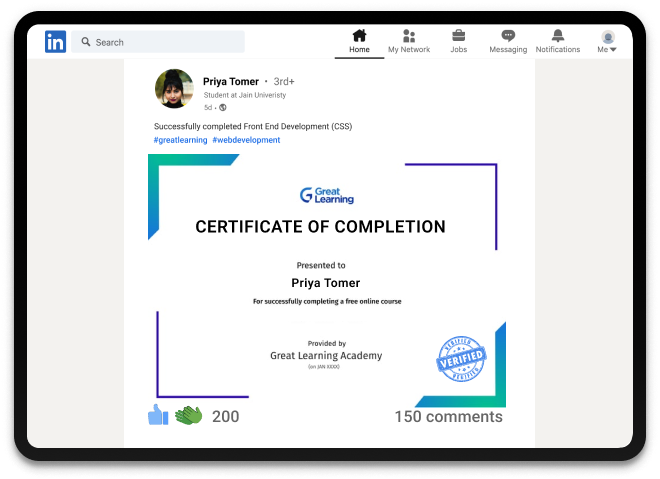Basics of Microsoft Dynamics 365
Enrol now and unlock the potential of Microsoft Dynamics 365! Elevate your skills with our free course on Data Management, Dynamics Applications, and more. Start your journey today!
What you learn in Basics of Microsoft Dynamics 365 ?
About this Free Certificate Course
Dive into the dynamic world of Microsoft Dynamics 365 with our free course, 'Basics of Microsoft Dynamics 365'. This beginner-friendly program is designed to introduce you to the core components of Dynamics 365, focusing on its robust Common Data Service. You'll gain a comprehensive understanding of how to manage and utilize data effectively within the Dynamics 365 ecosystem. The course is tailored to provide practical insights, helping you master data management skills essential for navigating today's digital landscape.
Expand your expertise with an in-depth exploration of Dynamics 365 Applications and the various services offered by Microsoft Dynamics. This section of the course emphasizes real-world applications and the versatility of Dynamics 365 in meeting diverse business needs. Whether you're looking to enhance your professional skills or simply curious about the power of Microsoft Dynamics, this course offers valuable knowledge and tools to propel your journey in the world of business solutions and data management.
Course Outline
In this module, you will learn the Microsoft Dynamics through the Common Data Service. Learn to harness unified data management for enhanced efficiency and collaboration across diverse business processes.
In this module, you will learn the data management within Microsoft Dynamics. Acquire skills to organize, integrate, and optimize data for seamless business operations and informed decision-making.
In this module, you will learn the proficiency in leveraging these applications to address specific business needs, ensuring a tailored and effective approach to enterprise solutions.
In this module, you will learn the customer relationship management to enterprise resource planning, discover how these services empower organizations with integrated and adaptive business solutions.
With this course, you get
Free lifetime access
Learn anytime, anywhere
Completion Certificate
Stand out to your professional network
1.0 Hours
of self-paced video lectures
Frequently Asked Questions
What prerequisites are required to enrol in this Free Microsoft Dynamics 365 course?
You do not need any prior knowledge to enrol in this Microsoft Dynamics 365 course.
How long does it take to complete this Free Microsoft Dynamics 365 course?
It is a 1.0 hour long course, but it is self-paced. Once you enrol, you can take your own time to complete the course.
Will I have lifetime access to the free course?
Yes, once you enrol in the course, you will have lifetime access to any of the Great Learning Academy’s free courses. You can log in and learn whenever you want to.
Will I get a certificate after completing this Free Microsoft Dynamics 365 course?
Yes, you will get a certificate of completion after completing all the modules and cracking the assessment.
How much does this Microsoft Dynamics 365 course cost?
It is an entirely free course from Great Learning Academy.
Success stories
Can Great Learning Academy courses help your career? Our learners tell us how.And thousands more such success stories..
Related Management Courses
Popular Upskilling Programs
Explore new and trending free online courses
Relevant Career Paths >
Basics of Microsoft Dynamics 365
Microsoft Dynamics 365 is a comprehensive suite of cloud-based business applications developed by Microsoft. It integrates Customer Relationship Management (CRM) and Enterprise Resource Planning (ERP) capabilities, providing organizations with a unified platform to streamline processes, enhance customer engagement, and drive business growth. Understanding the basics of Microsoft Dynamics 365 is crucial for businesses seeking a versatile solution to manage various aspects of their operations.
1. Unified Platform:
Microsoft Dynamics 365 brings together CRM and ERP functionalities into a single, integrated platform. This unified approach enables seamless collaboration between different business functions, breaking down silos and fostering a holistic view of business operations. The interconnected nature of Dynamics 365 allows data to flow seamlessly across sales, marketing, customer service, finance, and other departments.
2. Modular Structure:
Dynamics 365 is modular, allowing organizations to choose and deploy specific applications based on their business needs. The core modules include Sales, Marketing, Customer Service, Finance, Supply Chain Management, and more. Each module is designed to address specific business processes, and organizations can add or remove modules as their requirements evolve.
3. Customer Relationship Management (CRM):
Dynamics 365 CRM modules focus on improving customer interactions and relationships. The Sales module helps manage leads, opportunities, and sales processes, while the Marketing module enables organizations to plan and execute marketing campaigns. The Customer Service module enhances customer support by providing tools for case management and service automation.
4. Enterprise Resource Planning (ERP):
The ERP modules within Dynamics 365 cater to various business functions, including Finance, Supply Chain Management, Human Resources, and more. The Finance module helps manage financial operations, including budgeting, accounting, and reporting. The Supply Chain Management module optimizes supply chain processes, from procurement to inventory management.
5. Cloud-Based Accessibility:
Microsoft Dynamics 365 is a cloud-based solution, providing users with the flexibility to access data and applications from anywhere with an internet connection. This cloud-centric approach ensures that businesses can stay agile, scale easily, and benefit from regular updates and improvements delivered by Microsoft.
6. Integration with Office 365:
Dynamics 365 seamlessly integrates with Microsoft's Office 365 suite, enhancing productivity and collaboration. Users can leverage familiar tools such as Outlook, Excel, and SharePoint within the Dynamics 365 environment. This integration streamlines workflows and facilitates the sharing of information across the organization.
7. Artificial Intelligence (AI) and Analytics:
Dynamics 365 incorporates AI capabilities to provide predictive insights, automate routine tasks, and improve decision-making. AI-driven analytics help organizations derive actionable insights from their data, enabling them to make informed strategic decisions.
8. Customization and Extensibility:
Organizations can customize Dynamics 365 to align with their unique business processes. The platform offers tools for creating custom entities, workflows, and business rules. Additionally, developers can extend the functionality using the Power Platform, which includes Power BI for analytics, Power Apps for app development, and Power Automate for workflow automation.
9. Regular Updates and Support:
Microsoft regularly updates Dynamics 365, introducing new features, enhancements, and security updates. This ensures that organizations using the platform benefit from the latest technologies and improvements. Microsoft also provides robust support and a community for users to share knowledge and best practices.
In conclusion, Microsoft Dynamics 365 is a versatile and integrated business application platform that empowers organizations to streamline processes, enhance customer engagement, and drive business success. Its modular structure, cloud-based accessibility, integration with Office 365, and AI capabilities make it a compelling choice for businesses of various sizes and industries seeking a comprehensive solution for their CRM and ERP needs.












































.jpg)








